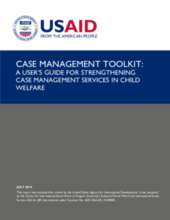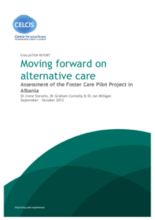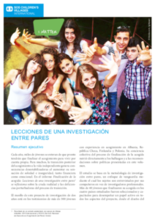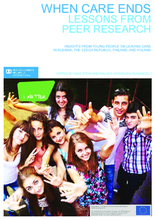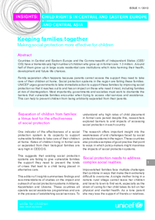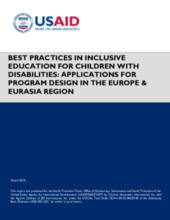Displaying 21 - 30 of 31
UNICEF Albania office wishes to invite applicants to submit a proposal for conducting an “Analysis of National Child Protection Systems in the Wider Context of the Social Protection System in Albania.”
The toolkit provides the user with a comprehensive assessment framework for analyzing current systems, procedures, and practices against international standards and professional case management practices at both the case level and system level. This toolkit does not promote a specific model of case management since no one approach or model can be applied to every situation. Rather, it outlines the beneficial aspects, processes, and strategies of case management that have shown improved outcomes for children and families.
This video from Al Jazeera English investigates the disappearance of 500 Albanian Roma children from a state-run residential institution in Athens, Greece over a decade ago.
This study described the magnitude of physical abuse during childhood in a representative sample of young adults selected from public universities in Albania, and to identify relationship between socioeconomic characteristics and behavioural/lifestyle factors associated with adverse childhood experiences.
This paper presents an evaluation of the pilot foster care project (FCPP) in Albania.
El meollo de este proyecto de investigación de dos años está en los testimonios de más de 300 jóvenes con experiencia en acogimiento en Albania, República Checa, Finlandia y Polonia. Su conciencia colectiva del proceso de finalización de la acogida nutrió directamente a los hallazgos y a las recomendaciones sobre políticas presentadas en este volumen.
This report presents the findings from a two-year peer research project which includes the testimony of more than 300 young people with care experience in Albania, the Czech Republic, Finland, and Poland. More than 40 care leavers from the four countries were selected and trained to play an active role in the all aspects of the projects. The interviews revealed widespread inadequacies regarding the process of leaving care, promoting the research team to draw up recommendations to address them.
This edition of Insights produced by UNICEF summarizes the findings and recommendations of studies on the impact and outreach of social protection systems in Albania, Kazakhstan, and Ukraine where high rates of child placement in formal care still persist. The research offers important insight into the weaknesses and challenges faced by social protection systems in the region, but also point to ways in which policy-makers might maximise the impact of social protection systems in order to ‘keep families together’.
The purpose of this study is to provide an overview of best practices in inclusive education, inform stakeholders of the current status of inclusive education in the region, describe the contextual factors which affect program implementation, and make recommendations of practical start-up steps for inclusive education programs.
A resource site based on the first Regional Consultation on Child Care System Reform held in Sofia in early July. The consultation brought together 120 key social welfare delegates from Albania, Bosnia & Herzegovina, Bulgaria, Croatia, UN-administered Kosovo, FYR Macedonia, Montenegro, Romania, Serbia and Turkey.


